Correcting Subject Access to Resources on Indigenous Nations: Creating Best Practices
by Richard Sapon-White
Library users often search for books and other resources by topic, making use of subject headings constructed and assigned to works by catalogers. United States libraries use a standard subject heading thesaurus, Library of Congress Subject Headings (LCSH). Unfortunately, terms in LCSH for many Indigenous peoples of the United States may be incorrect, derogatory, or missing. I asked two colleagues to assist with the project: Sara Levinson at UNC Chapel Hill, the lead for the Latin American and Indigenous Peoples of the Americas funnel program of the Program for Cooperative Cataloging; and Pamela Louderback (Haudenosaunee, Mohawk), library director at Northeastern State University, Broken Arrow Campus, in Oklahoma. Our project, “Training Library Catalogers on Creating Culturally Sensitive Subject Headings for Indigenous Tribal Names and Related Topics,” used a three-phase approach to address this issue through training, reflection, and the creation and distribution of best practices.
In the first phase, we invited catalogers and other librarians to attend a one-day workshop to learn how to create subject heading proposals on Indigenous topics for approval by the Library of Congress. The workshop was held in October 2022 on the campus of the College of the Muscogee Nation in the hope that we could attract Indigenous librarians. Our Alumni TIES grant enabled us to offer the workshop free of charge and with reimbursement for travel expenses for attendees. Although the turnout (fourteen attendees) was smaller than what we had expected, several attendees were enrolled members of federally recognized tribal nations and all were very enthusiastic about the workshop and project. Workshop leaders discussed the mechanics of creating and submitting subject heading proposals with particular emphasis on creating proposals for names of Indigenous nations. The workshop covered corrections of existing subject headings and topical subject headings related to the names of Indigenous nations (e.g., Choctaw art, Cherokee youth). Participants were asked to create at least one proposal after the workshop.
During the second phase, participants created their proposals. This month-long process included virtual consultation meetings with the workshop leaders as well as two interviews with our advisory board. The board consisted of two Indigenous librarians; the interviews focused on eliciting feedback on the process, identifying obstacles to creating the proposals and highlighting reference sources that participants found useful. This feedback informed the third phase of the project ̶ the creation of a set of best practices. Ultimately, participants created six subject headings which the Library of Congress subsequently approved for inclusion in LCSH. Participants were very enthusiastic about the work that they had done and reported wanting to continue this important work on their own after the conclusion of the project.
In the final phase, the project leaders wrote a thirty-five-page manual of suggested best practices, Creating Subject Headings for Indigenous Topics: A Culturally Respectful Guide, covering the material presented at the workshop with modifications informed by participant interviews. We commissioned an Indigenous artist to create a beautiful cover for the booklet. We then printed and distributed five hundred copies to libraries across the United States and Canada as well as several other countries. The best illustration of the impact of our project activities comes from the comments received when advertising our completed manual.
- “Be proud that you took on this overwhelming work!” (Washington, DC)
- “Thank you for your hard work on Indigenous subject headings! We were really needing this.” (Fort Washakie, WY)
- “I am so excited about this project. Please let me be a part of this fantastic project, please send me a copy.” (Whittier, CA)
- “Thank you for doing this very challenging and important work.” (Dana Point, CA)
- “We have an Indigenous Knowledge Collection that we have been working on updating to a Brian Deer schema, and this booklet would both fit perfectly in the collection and be a useful guide for ourselves moving forward. We would definitely like a copy, though if possible could we get two? One for staff use and one for circulation?” (Juneau, AK)
- “Thank you so much for your work and your publications and presentations in this area.” (Princeton, NJ)
- “Chi miigwech for your work and for sharing it!” (Alexandria, VA)
- “My colleague sent me information about the project/booklet “Creating Correct Subject Headings for Indigenous Topics.” We would love a copy for our cataloger for an upcoming project we have to update the subject headings for our Tribal Law collection.” (Tucson, AZ)
- “Aloha e Richard, … I am a Librarian at the Center for Hawaiian Studies at the University of Hawaiʻi. I saw your email to the LAIPA group about the upcoming manual. …Mahalo for extending the offer of the manual so widely, congratulations to you, Sara, and Pamela on your folks’ important work!” (Honolulu, HI)
The gratitude expressed for this manual and the significance it holds for the librarians who requested copies is evident in these comments, as well as the number of requests we received. These responses not only confirm the importance of the project we undertook, but also underscore the positive emotional impact that we have had.
Richard Sapon-White is a 2005 Fulbright Scholar in Czechia and a 2012–2013 Fulbright Scholar in Poland. He participated in the March 2022 Alumni TIES seminar on American Identity: Exploring Our Collective Memory, Heritages, and Histories in Minneapolis, Minnesota.
Alumni TIES is sponsored by the U.S. Department of State with funding provided by the U.S. Government and supported in its implementation by World Learning, in partnership with the Office of Alumni Affairs of the Bureau of Educational and Cultural Affairs (ECA).
